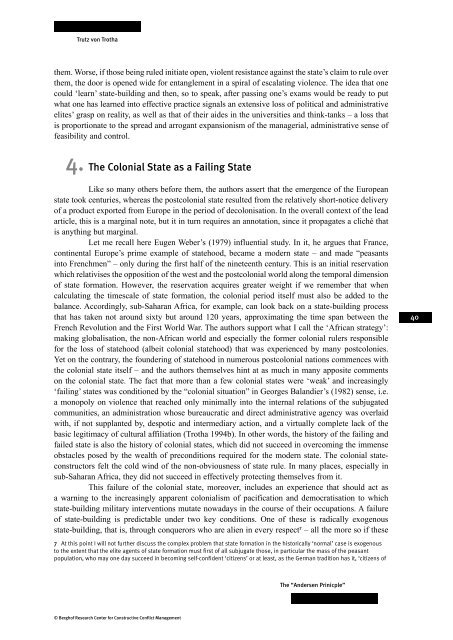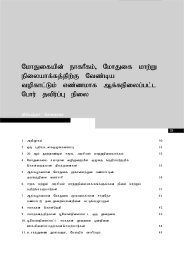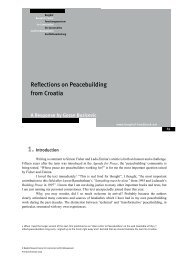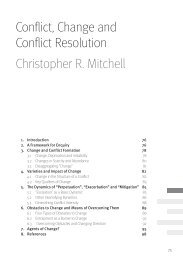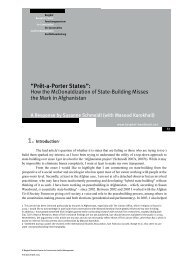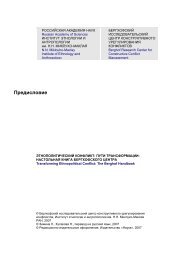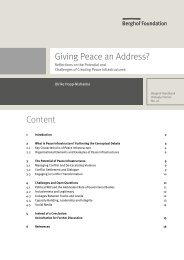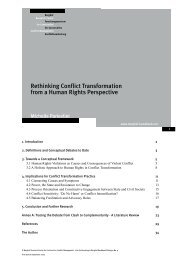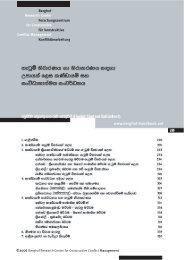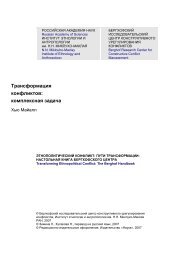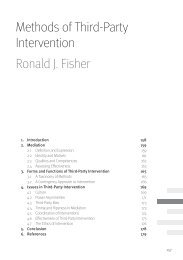Andersen Principle - Berghof Handbook for Conflict Transformation
Andersen Principle - Berghof Handbook for Conflict Transformation
Andersen Principle - Berghof Handbook for Conflict Transformation
You also want an ePaper? Increase the reach of your titles
YUMPU automatically turns print PDFs into web optimized ePapers that Google loves.
Trutz von Trotha<br />
them. Worse, if those being ruled initiate open, violent resistance against the state’s claim to rule over<br />
them, the door is opened wide <strong>for</strong> entanglement in a spiral of escalating violence. The idea that one<br />
could ‘learn’ state-building and then, so to speak, after passing one’s exams would be ready to put<br />
what one has learned into effective practice signals an extensive loss of political and administrative<br />
elites’ grasp on reality, as well as that of their aides in the universities and think-tanks – a loss that<br />
is proportionate to the spread and arrogant expansionism of the managerial, administrative sense of<br />
feasibility and control.<br />
4. The Colonial State as a Failing State<br />
Like so many others be<strong>for</strong>e them, the authors assert that the emergence of the European<br />
state took centuries, whereas the postcolonial state resulted from the relatively short-notice delivery<br />
of a product exported from Europe in the period of decolonisation. In the overall context of the lead<br />
article, this is a marginal note, but it in turn requires an annotation, since it propagates a cliché that<br />
is anything but marginal.<br />
Let me recall here Eugen Weber’s (1979) influential study. In it, he argues that France,<br />
continental Europe’s prime example of statehood, became a modern state – and made “peasants<br />
into Frenchmen” – only during the first half of the nineteenth century. This is an initial reservation<br />
which relativises the opposition of the west and the postcolonial world along the temporal dimension<br />
of state <strong>for</strong>mation. However, the reservation acquires greater weight if we remember that when<br />
calculating the timescale of state <strong>for</strong>mation, the colonial period itself must also be added to the<br />
balance. Accordingly, sub-Saharan Africa, <strong>for</strong> example, can look back on a state-building process<br />
that has taken not around sixty but around 120 years, approximating the time span between the<br />
French Revolution and the First World War. The authors support what I call the ‘African strategy’:<br />
making globalisation, the non-African world and especially the <strong>for</strong>mer colonial rulers responsible<br />
<strong>for</strong> the loss of statehood (albeit colonial statehood) that was experienced by many postcolonies.<br />
Yet on the contrary, the foundering of statehood in numerous postcolonial nations commences with<br />
the colonial state itself – and the authors themselves hint at as much in many apposite comments<br />
on the colonial state. The fact that more than a few colonial states were ‘weak’ and increasingly<br />
‘failing’ states was conditioned by the “colonial situation” in Georges Balandier’s (1982) sense, i.e.<br />
a monopoly on violence that reached only minimally into the internal relations of the subjugated<br />
communities, an administration whose bureaucratic and direct administrative agency was overlaid<br />
with, if not supplanted by, despotic and intermediary action, and a virtually complete lack of the<br />
basic legitimacy of cultural affiliation (Trotha 1994b). In other words, the history of the failing and<br />
failed state is also the history of colonial states, which did not succeed in overcoming the immense<br />
obstacles posed by the wealth of preconditions required <strong>for</strong> the modern state. The colonial stateconstructors<br />
felt the cold wind of the non-obviousness of state rule. In many places, especially in<br />
sub-Saharan Africa, they did not succeed in effectively protecting themselves from it.<br />
This failure of the colonial state, moreover, includes an experience that should act as<br />
a warning to the increasingly apparent colonialism of pacification and democratisation to which<br />
state-building military interventions mutate nowadays in the course of their occupations. A failure<br />
of state-building is predictable under two key conditions. One of these is radically exogenous<br />
state-building, that is, through conquerors who are alien in every respect 7 – all the more so if these<br />
7 At this point I will not further discuss the complex problem that state <strong>for</strong>mation in the historically ‘normal’ case is exogenous<br />
to the extent that the elite agents of state <strong>for</strong>mation must first of all subjugate those, in particular the mass of the peasant<br />
population, who may one day succeed in becoming self-confident ‘citizens’ or at least, as the German tradition has it, ‘citizens of<br />
© <strong>Berghof</strong> Research Center <strong>for</strong> Constructive <strong>Conflict</strong> Management<br />
The “<strong>Andersen</strong> Prinicple”<br />
40


